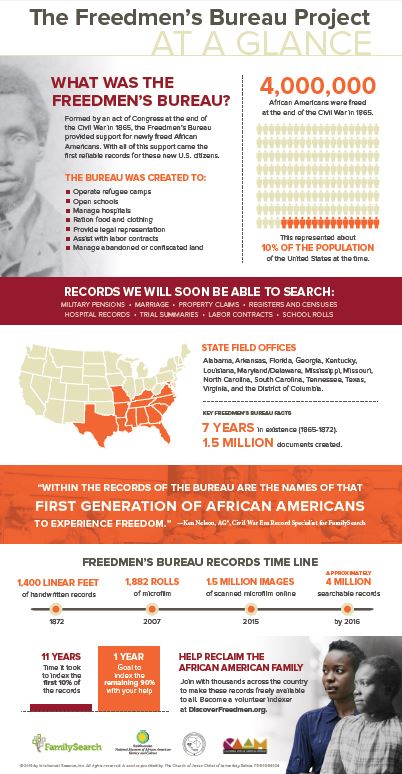 The more I learn about U.S. history and records, the more I appreciate the challenges faced by those researching their African-American roots. In addition to the emotional toll of learning about their ancestors’ hardships, today’s researchers face the practical challenges of finding kin in records that mostly ignored their existence.
The more I learn about U.S. history and records, the more I appreciate the challenges faced by those researching their African-American roots. In addition to the emotional toll of learning about their ancestors’ hardships, today’s researchers face the practical challenges of finding kin in records that mostly ignored their existence.
That’s why I’m super excited that the Freedmen’s Bureau records are finally being fully indexed. Scattered records are already transcribed (see the Freedmen’s Bureau Online). But there hasn’t been a comprehensive index of its 1.5 million state field agency documents. These include military pensions, marriage records, property claims, hospital records, trial summaries, labor contracts, school rolls, registers and censuses. Many of the four million African-Americans freed from slavery are mentioned, as are many white Southerners.
FamilySearch indexers began quietly indexing Freedmen’s Bureau records in 2009: the state of Virginia’s records are already searchable. Last week, in observance of the Juneteenth holiday (which celebrates emancipation), FamilySearch issued a call to action. They asked for help indexing the rest of the Freedmen’s Bureau within the year.
“Records, histories and stories will be available on DiscoverFreedmen.org,” says a release. “Additionally, the records will be showcased in the Smithsonian’s National Museum of African American History and Culture, which is currently under construction on the National Mall in Washington, D.C., and expected to open in late 2016.”
 Here’s a quick history lesson: The Freedmen’s Bureau was organized after the Civil War to aid newly-freed slaves in 15 states and Washington, DC. For several years it gathered “handwritten, personal information on freed men, women and children, including marriage and family information, military service, banking, school, hospital and property records,” according to FamilySearch.
Here’s a quick history lesson: The Freedmen’s Bureau was organized after the Civil War to aid newly-freed slaves in 15 states and Washington, DC. For several years it gathered “handwritten, personal information on freed men, women and children, including marriage and family information, military service, banking, school, hospital and property records,” according to FamilySearch.
The richest genealogical records of the Freedmen’s Bureau are in the field office records of each state. Click here to download a PDF from the National Archives about these original records.
Find more tips on finding African-American and other Southern U.S. ancestors here on the Genealogy Gems website. Recent posts include:
- Missing Birth Record? Here’s What You Can Do To Track It Down (example from Tupelo, MS)
- The 1910 Census in Puerto Rico: A Surprising Record on Using Census Records for Genealogy (on understanding race in the census)
- Free Civil War Veterans Database: Soldiers and Sailors (on African-American sailors in the Civil War)
 Receive a heads-up about posts like these–and get a free e-book on Google searching for genealogy–when you subscribe to the free Genealogy Gems newsletter in the upper right corner of this webpage or our home page.
Receive a heads-up about posts like these–and get a free e-book on Google searching for genealogy–when you subscribe to the free Genealogy Gems newsletter in the upper right corner of this webpage or our home page.
